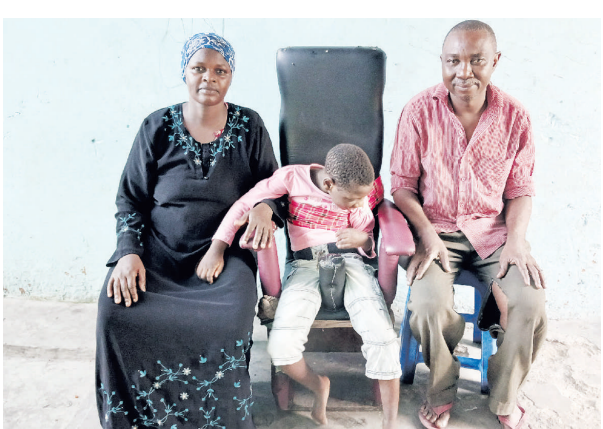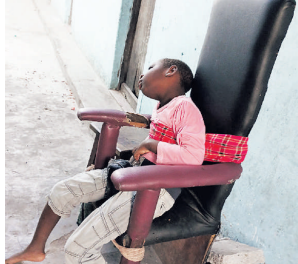
For nine long years, a family in Mombasa has been grappling with heartbreak and hardship as they seek medical help for their daughter.
Mwanaasha Mwaka, bedridden and unable to sit, walk or speak since she was six months old, was born a healthy child.
However, after she started crawling, her life took a tragic turn, leaving her family overwhelmed by emotional and financial burdens.
Zainab Rumba, a mother of five, recalls the fateful day her house help called to say her daughter was unwell, a moment she could never have imagined would mark the beginning of a lifelong struggle.
“That morning when we left the house for work, my daughter was okay and in good health. At around 10.00am, I received a call from home that she was sick and her temperature was high,” she recalled.
She immediately rushed home to find her vomiting, and suffering from diarrhea, her body burning with fever. Mwaka was rushed to Mwahima Hospital in Likoni subcounty for first aid.
As they tried to reduce her temperature, she started convulsing. “The hospital told us they could not admit her due to her condition and referred us to St Thomas Hospital but at the entrance, we were turned away because her condition had worsened,” Rumba said.
They were referred to Nyali Children’s Home, a private hospital in Likoni, where they were asked to pay a deposit of Sh50,000 because she needed to be put on oxygen.
“We didn’t have the ability to raise the cash. The hospital asked us to pay Sh2,000 ambulance fee, which we did before my child was rushed to Coast General Teaching and Referral Hospital (CGTRH), where she was taken directly to the emergency room at around 11pm.”
Hamisi Ibrahim, Mwaka’s father, received a call from his wife about his daughter’s condition. What started as a usual flu, he said, turned out to be a disaster.
His daughter was in a coma for three weeks at CGTRH. When she woke up from the coma, her condition was dire though her eyes were open. After 21 days of hospitalisation, the doctors diagnosed Mwaka with meningitis.
“When I left home for work that morning, my child was very healthy, but when I received the news that my child was sick, I didn’t expect it to turn into what it is today. I remember working during the day and spending the nights with my child at CGTRH for 21 days,” he said.
“It was traumatising because we shared a ward with children in a similar condition. Many lost their lives and every time a child died, my daughter would be moved to that bed. It was hard for me but we overcame it and went home after discharge.”
Despite having the joy of leaving the hospital, Ibrahim said he felt a thorn piercing his heart because their daughter, who was crawling, could no longer move or sit. Her body was stiff and her development had regressed.
“I felt bad when the doctor told me there was no other treatment for her condition other than the therapies. We were advised to buy standing and sitting aids but we could not afford due to our financial status,” he said.
DAUGHTER OVER WORK
Mwaka’s condition put her mother in an awkward position. “My daughter was in a coma for 21 days. I thought it was a relief when she woke up. I didn’t know it was the beginning of sorrow and pain,” Rumba recalls.
After the hospital discharge, Rumba said her then boss where she used to work was understanding about her daughter’s condition, but when she reached the age of three, things changed, forcing her to choose between the well-being of her daughter and work.
“My boss told me to reduce the therapy sessions to focus on work, so I cut them from twice a week to once and promised him to deliver because at the end of the day, I also needed the money to support her,” she said.
“When she turned four years old, she became a burden to my house manager and at the age of five, things changed at work, I was told to fully focus on my work, a decision that made me stop taking her for therapy sessions.”
Her father could not help with therapy sessions due to the nature of his work at a security firm. “When she turned seven, her health started deteriorating,” Rumba said.
“I couldn’t watch her suffer because I was away and that is when I decided to quit my job.”
As a mother, Rumba says it hurts seeing her baby grow in a painful condition, “I feel bad as a mother because my only wish is to see my child improve from her condition and get dependent. Right now, I can’t do anything, I can’t leave my child with anyone, I still want to know what medication can help my child.”
Efforts to enrol Mwaka to different special schools have failed because teachers keep saying she cannot be admitted in school because of her condition.
“I remember taking her to school, but due to her condition, it was hard for her to be accepted. One time, as we waited by the roadside for the school bus, the driver saw us but drove off and refused to answer my calls. I was devastated and cried while holding my child. When he finally answered, he told me that if I took her to school again, I would have to figure out her way back home because they saw her as a burden,” she said.
Rumba still has her child’s uniforms, hoping that one day she will get better and attend school just like other children. Ibrahim added that as a father, he feels so hurt.
“Even if my daughter will not talk, I just want to see her sitting on her own. We have so many children with similar conditions but they can move and walk using crutches. I wish my child could get help and just sit” he said.
“This is a person who sleeps from morning to evening. If she gets tired, we carry her and move her to another place. If I had money, I could have taken my daughter to India for treatment because I believe nothing is impossible with doctors.”
DOCTOR’S DIAGNOSIS
Kamanza Mwatela, an occupational therapist at the Coast General Teaching and Referral Hospital (CGTRH), explained that Mwaka contracted meningitis, an infection of the brain meninges.
It affected her brain cells, interrupting her development pattern and leading to cerebral palsy. He said meningitis, a bacterial or viral infection found in the environment, can easily infect children, especially those under five years, who are prone to infections.
It is not very common but when it happens, its effects are diverse.
“In Mwaka’s case, the condition caused high spasticity in her limbs, hindering her mobility, speech and social integration,” Mwatela said.
Through occupational therapy, the aim is to relax her muscle tone and use splints to prevent contractures.
“Although she may not regain full abilities, we train her to acquire critical milestones like speech and communication, movement from one place to another, crawling, vision, independence and sensation,” he said.
“Right now, Mwaka needs occupational therapy, where she will be trained on segmental rolling, independent sitting, acquiring creeping, crawling and walking patterns,” Mwatela said.
“She also needs splints to prevent contractures, self-care training, how to process information from the environment and communicate back, learn how to socially integrate with other people, a process that is supposed to be continuous throughout life.”
The CGTRH has all the services required to help children with cerebral palsy. However, he said the high cost of splints and the long distances are some of the challenges affecting parents raising these children.
“The splints are expensive because we do not have the materials at the hospital,” Mwatela said. “But once we acquire the materials, then it can become slightly fairer and cheaper because as the child grows, the splints become limited in size, so it’s like another splint needs to be fabricated.”

CALL FOR HELP
The family is appealing to well-wishers to help them get good treatment for their child.
“We welcome any kind of help to save our daughter from her condition. Today we might have that strength of moving her from one place to another but tomorrow, we might not be able to do so,” Mwaka’s father said.
He called upon well-wishers to help them get a sitting aid because the one she has outgrown the one she is currently using.
Currently, the family relies on free therapy sessions twice a week but the progress is minimal. With only one breadwinner, they say taking care of her is expensive because she needs diapers every day.
“She cannot even scratch herself. Therapy sessions have brought slight changes, such as her ability to turn herself, but she still cannot move,” Ibrahim said.
Doctors have assured the family that the condition is treatable, but they lack the resources to access specialised care.
“There are doctors in Kenya who can help my daughter to sit and walk but they are expensive. I know we can get help at Kijabe Hospital but our ability to raise that money is minimal,” he said.
“Therefore, we are calling upon well-wishers to help us treat our child so she can be like other children. It hurts when I see her suffer.”
At the moment, he said he cannot tell the approximate needed for the treatment, hoping to get a specialist who can examine her and give information on how much is needed.
She has so many challenges, starting from her brain, spinal cord to her legs. Ibrahim encouraged parents raising children with similar conditions not to hide them but expose them.
“Let these children be seen with the community so they know we have children with such conditions who need help just the way I need,” he said.
Mwatela, the occupational therapist, called upon parents raising children with meningitis-related brain injuries to seek counselling services and accept their children’s conditions.
“Taking them to therapy helps integrate them into society and improve their quality of life,” he said.
He encouraged parents to also request home programmes from the hospital where the child can continue with therapy at home.
At CGTRH, there is a disability assessment programme done in the community, which has helped them reach out to more children with similar conditions.
Mwatela said most parents cannot afford the therapy sessions for their children because it is costly and lifelong.
“We charge Sh300 per session at CGTRH. If it’s a child who comes three times a week, a parent has to pay Sh900 plus transport,” he said.
“Many parents cannot afford consistent care, and that is why there is a need for the government to station therapists within communities to reduce costs and improve access.”
He said that instead of having 10 parents taking their children for therapy spending the whole day in hospital, one therapist can be assigned in the community to help those 10 children.
This will not only encourage parents to seek treatment for their children but reduce poverty in the community, and also help adults who have had brain development-interfering conditions like stroke.
“I am very positive about the Social Health Authority. Let us start from the dispensaries, Level 1, 2 and 3 going upwards,” he said.
Mwatela said there is no need for accumulating occupational therapists, physiotherapists and orthopedic doctors in a referral hospital, yet patients come from the community.
To assist the family, please send your contributions to: Ibrahim Hamisi - 0728 738455















